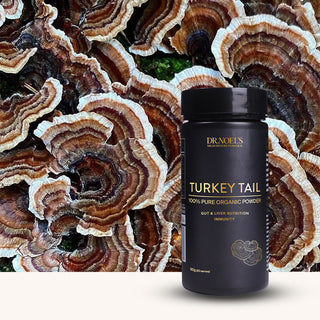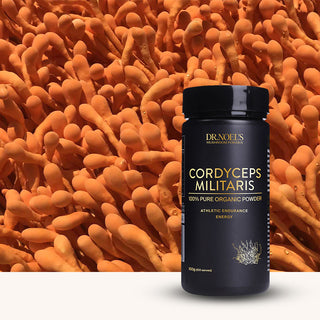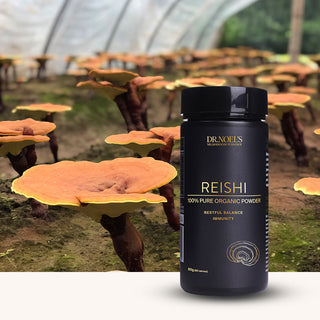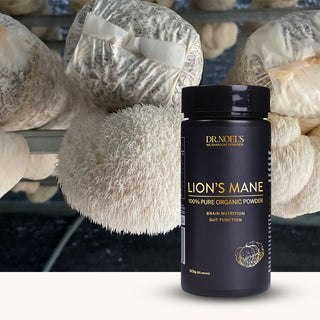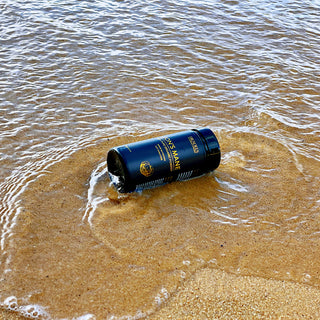Check out the interview below covering Dr Noel’s journey with medicinal mushrooms, how to identify a top quality medicinal mushroom product, and some insights into the Australian medicinal mushroom supplement industry.

Q&A With Leo
How did Dr Noel personally start his journey into the world of medicinal mushrooms?
Dr Noel started his mushroom journey 40 years ago after he finished his phd degree in microbiology. In the beginning of 2007, he found that medicinal mushrooms are very unique and special in Traditional Chinese medicine, Although there was not much research literature at that time to study the effects of medicinal mushrooms from a scientific point of view, he believes it will become a new revolution of the health and nutrition industry, just like people first find Vitamin C.
Can you please give us a brief history about Dr. Noel’s Mushroom Powders?
Dr Noel and Xingli met at an International Mushroom Conference in 1998 and have been firm friends and colleagues for over 22 years. Xingli worked and studied at Dr Noel’s farm for over 2.5 years, before returning to China in 2002 to launch her own organic certified medicinal mushroom farms and greenhouses. Her business is located in Lishui in the Zhejiang province, a region known as the birthplace for Maitake, Shiitake and Reishi. Lion’s Mane are cultivated in Gutian County, in Fujian province and wildcrafted mushrooms, such as Turkey Tail and Chaga are typically are grown in the wild forest in Heilongjiang province, along with cultivated Cordyceps Militaris mushrooms. In 2012, Xingli expanded her business to establish a modern manufacturing laboratory, using the latest technology and standards to produce premium quality dried mushroom powders.
What differentiates Dr. Noel’s Mushroom Powders from other brands?
There are four main differences between us and others.
- We own the medicinal mushroom grow farms and 100% control the growing process.
- We own the modern technology manufacturing and 100% control the manufacturing process.
- All our powders are USDA and EU organic certified.
- Our Powders are 1005 pure mushroom extracted powders, which is roughly 4 times higher potency than others. When you consume the same quantity between ours and others we can provide more strength and lead to a quicker and better result.
What has been the biggest challenge for Dr. Noel’s Mushroom Powder in the medicinal mushroom industry? How did you overcome it?
The biggest challenge in the medicinal mushroom industry in Australia is some big and famous brands are not honest. Their products’ qualities are not as good as what they described. But they are very good at marketing, with bad quality products, which leads more people don’t believe the benefits from medicinal mushrooms.
From the enquiries that you receive, what are the most common health conditions that people face and use your products for?
People want to improve their memory and find some products, which could help them fight cancer. Some of our customers would like to find medicinal mushrooms to help their pet fight cancer.
What future challenges do you anticipate for Dr. Noel’s Mushroom Powder in the medicinal mushroom industry? Where do you see the industry heading?
The biggest challenge for us is to set the industry standard for medicinal mushroom products. Every cent spent by every customer needs to be valuable, instead of the customer spending money on a bunch of fillers which have no health benefits. Medicinal mushrooms will generally be accepted by more customers and will be the next generation of vitamins.
“The biggest challenge for us is to set the industry standard for medicinal mushroom products. Every cent spent by every customer needs to be valuable, instead of the customer spending money on a bunch of fillers which have no health benefits.”
What constitutes a good quality product?
- 100% pure medicinal mushroom powders, no filler.
- Claim clear to either mushroom powder or mushroom extract.
- Certified organic
- Meets the GMP or FSSC industry standard.
What are your thoughts on the use of mycelium in products?
There is evidence of benefits from Mycelium products from laboratory tests. However, there are big differences between the lab testing and the final products on shelf. In the lab they can use 100% pure mycelium extracts, which may contain a high level of beta-glucans and achieve amazing results. However, to get 100% pure mycelium products is not cost effective and most of the mycelium contained products, contains a majority amount of rice or other mycelium growing base material. These final products usually contain a lot of filler and negligible mycelium and can hardly bring any health benefits to customers.
Various brands discredit the use of Chinese grown mushrooms and promote locally grown mushrooms? Why is this so?
The public knows very little about China, and is also influenced by the media publicity. They feel that the products produced in China are inferior. It is not ruled out that some irresponsible brands directly promote and sell the raw materials imported from China without verifying the quality of the raw materials imported from China. This causes a bad reaction.
Some brands take advantage of this poor information, and then try to depreciate the mushrooms produced in China and promote local mushrooms, in order to attract customers and gain big profits.
Supporting local industries and businesses is good in itself, but consumers should get quality products equal to what they paid for, rather than paying a lot of money for so-called locally produced inferior products.
With the development of the industry, people will eventually find what are the good products that are good for their health no matter where they are made.
